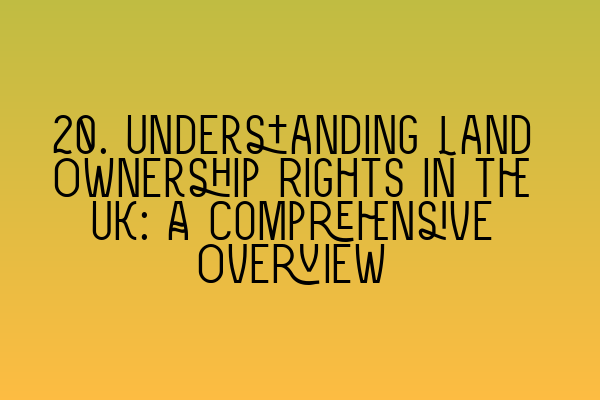Understanding Land Ownership Rights in the UK: A Comprehensive Overview
Introduction:
Land ownership is a fundamental concept in property law, and it is crucial for individuals and businesses to have a comprehensive understanding of their rights pertaining to land in the UK. Whether you are a property owner, tenant, or investor, knowing the various types of land ownership and the associated rights and responsibilities is essential to make informed decisions and ensure compliance with the law.
In this blog post, we will provide a comprehensive overview of land ownership rights in the UK, covering topics such as freehold ownership, leasehold ownership, and commonhold ownership. We will also explore the different types of land interests, including legal estates and equitable interests. So, let’s dive in!
1. Freehold Ownership:
Freehold ownership is the highest form of land ownership in the UK, granting the owner complete and absolute title to the land. As a freehold owner, you have indefinite tenure and can exercise various rights, such as the right to occupy and use the land, the right to exclude others from the land, and the right to sell or transfer the land. To obtain freehold ownership, you typically purchase the land outright or inherit it.
2. Leasehold Ownership:
Leasehold ownership is a common form of land ownership in the UK, especially in urban areas. As a leaseholder, you have the right to occupy and use the land for a fixed period of time as stipulated in the lease agreement. While you do not hold the ultimate ownership of the land, you have a legal interest in the property. Leasehold ownership is often associated with residential properties, commercial premises, and leasehold flats. It is important to understand the terms and conditions of the lease, including ground rent and service charges.
3. Legal Estates:
Legal estates refer to the types of interests that individuals can hold in land. These estates can be either freehold or leasehold. When it comes to freehold estates, there are two main types:
a. Fee Simple Absolute: The fee simple absolute is the most extensive form of freehold ownership, granting the owner complete and unconditional rights over the land. This is the kind of ownership that is often referred to as “owning the land.”
b. Fee Tail: Fee tail is a less common type of freehold ownership, and it involves limiting the inheritance of the land to a specific bloodline or descendants. This type of ownership has largely been replaced by fee simple absolute.
For leasehold estates, the most common legal estates are:
a. Fixed-term leases: These leases have a defined duration, typically ranging from a few years to several decades. Once the lease term expires, the land reverts to the freeholder.
b. Periodic tenancies: Periodic tenancies are leasehold estates that automatically renew for a fixed period (usually month-to-month or year-to-year) unless terminated by either party. These tenancies provide flexibility but can be terminated by the landlord with proper notice.
4. Equitable Interests:
In addition to legal estates, individuals can also hold equitable interests in land. Equitable interests are non-legal interests that arise through agreements, understandings, or trusts. These interests are recognized in equity rather than through the legal system and may not be immediately apparent in legal title documents. Equitable interests can include beneficial interests, resulting trusts, and contractual rights.
5. Commonhold Ownership:
Commonhold ownership is a relatively new form of land ownership introduced by the Commonhold and Leasehold Reform Act 2002. It allows multiple individuals to own freehold interests in units within a building or development collectively. Each unit owner becomes a member of the commonhold association, which manages and maintains the common parts of the property. Commonhold ownership offers a flexible and simplified alternative to leasehold ownership, promoting shared responsibility and decision-making among unit owners.
Conclusion:
Having a clear understanding of land ownership rights in the UK is crucial for anyone involved in property transactions or interested in investing in land. Whether you are a freehold owner, leaseholder, or considering commonhold ownership, being well-informed about your rights and responsibilities enables you to make informed decisions and protect your interests.
If you found this overview helpful and want to further enhance your understanding of property law and land law, consider exploring our related articles:
– SQE 1 Practice Exam Questions: SQE 1 Practice Exam Questions
– SQE 1 Practice Mocks FLK1 FLK2: SQE 1 Practice Mocks FLK1 FLK2
– SQE 2 Preparation Courses: SQE 2 Preparation Courses
– SQE 1 Preparation Courses: SQE 1 Preparation Courses
– SRA SQE Exam Dates: SRA SQE Exam Dates
Remember, seeking professional advice from a qualified solicitor is always recommended when dealing with specific land ownership issues or property transactions.
